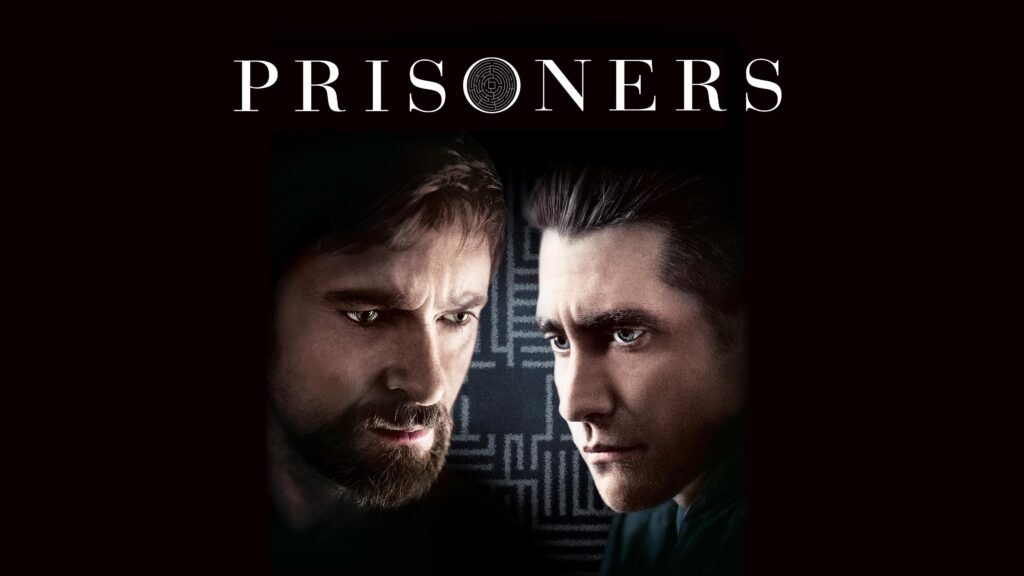
Prisoners (2013), directed by Denis Villeneuve, is a chilling and intense thriller that delves into the dark depths of morality, justice, and the lengths to which people will go when pushed to the brink. With an all-star cast led by Hugh Jackman and Jake Gyllenhaal, the film delivers a riveting, emotionally charged story that keeps viewers guessing until the very end. Featuring a combination of gripping performances, haunting visuals, and thought-provoking themes, Prisoners is an unforgettable cinematic experience.
The film centers on the abduction of two young girls from a quiet suburban neighborhood, a crime that sends shockwaves through the families involved. Keller Dover (Hugh Jackman), the father of one of the missing girls, is a man of faith and principle, but the disappearance of his daughter Anna shatters his world. When the police, led by Detective Loki (Jake Gyllenhaal), fail to find the girls quickly, Keller takes matters into his own hands. His prime suspect is Alex Jones (Paul Dano), a mentally impaired young man who was seen near the crime scene but lacks any solid evidence linking him to the crime.
Keller’s desperation grows with each passing day, and as he spirals into despair, he kidnaps Alex, convinced he holds the key to finding the girls. What follows is a disturbing and complex exploration of moral ambiguity, as Keller’s actions blur the line between justice and vengeance. He locks Alex in a run-down apartment, torturing him in the hopes of getting a confession, all while hiding his extreme methods from his family and the authorities. This act of vigilante justice places the audience in a moral quandary—do Keller’s actions make him a hero or a monster?
On the other side of the investigation is Detective Loki, portrayed by Jake Gyllenhaal with a quiet intensity that contrasts with Jackman’s raw emotion. Loki is methodical, determined, and driven by an unspoken personal code. His investigation leads him down a twisting path of red herrings, dark secrets, and buried trauma. Gyllenhaal’s performance is subtle yet powerful, as Loki tries to maintain control in a case that seems increasingly impossible to solve. His character is a perfect foil to Keller, as they both grapple with their own demons in pursuit of the same goal—finding the missing girls.
The performances in Prisoners are nothing short of exceptional. Hugh Jackman delivers one of his career-best roles as a father consumed by fear and anger. His portrayal of Keller Dover is both heartbreaking and terrifying, as he becomes a man willing to commit unspeakable acts to protect his family. Jake Gyllenhaal, in turn, brings a brooding and focused energy to the role of Detective Loki, balancing Jackman’s intensity with his own brand of quiet resolve.
Paul Dano’s performance as Alex Jones is eerie and unsettling, as he plays a man who seems both innocent and deeply suspicious. His portrayal adds to the tension, leaving the audience unsure of his guilt or innocence. Melissa Leo and Viola Davis also deliver strong supporting performances, adding emotional depth to the families torn apart by the tragedy.
Denis Villeneuve’s direction is masterful, creating a palpable sense of dread and tension that permeates every scene. The film’s pacing is deliberately slow, allowing the suspense to build as the mystery deepens. Roger Deakins’ cinematography adds to the film’s bleak atmosphere, with muted colors and stark lighting that reflect the cold, unforgiving nature of the story. The film’s setting, a rain-soaked, wintry suburban landscape, serves as a metaphor for the characters’ emotional states—isolated, hopeless, and trapped.
Prisoners isn’t just a crime thriller; it’s a meditation on the moral complexity of justice. It raises difficult questions about how far a person should go to protect their loved ones, and whether vengeance can ever be justified. As Keller’s actions become increasingly brutal, the film forces viewers to confront their own beliefs about right and wrong. By the end, Prisoners leaves audiences grappling with these questions long after the credits roll.
The film’s conclusion is as ambiguous as the questions it raises. Villeneuve provides no easy answers, leaving viewers to interpret the final moments for themselves. It’s a fitting end to a film that thrives on uncertainty and moral ambiguity.
In conclusion, Prisoners (2013) is a harrowing and powerful film that stands as one of the best thrillers of the decade. With outstanding performances, haunting visuals, and a deeply unsettling narrative, it’s a film that will leave a lasting impact on anyone who watches it. It’s more than just a mystery—it’s a profound exploration of human nature, morality, and the terrifying lengths to which people will go when pushed to their limits.
Where to watch: Available on Netflix, Amazon Prime Video, and other streaming platforms.
Rating: 8.1/10 on IMDb | 81% on Rotten Tomatoes.




